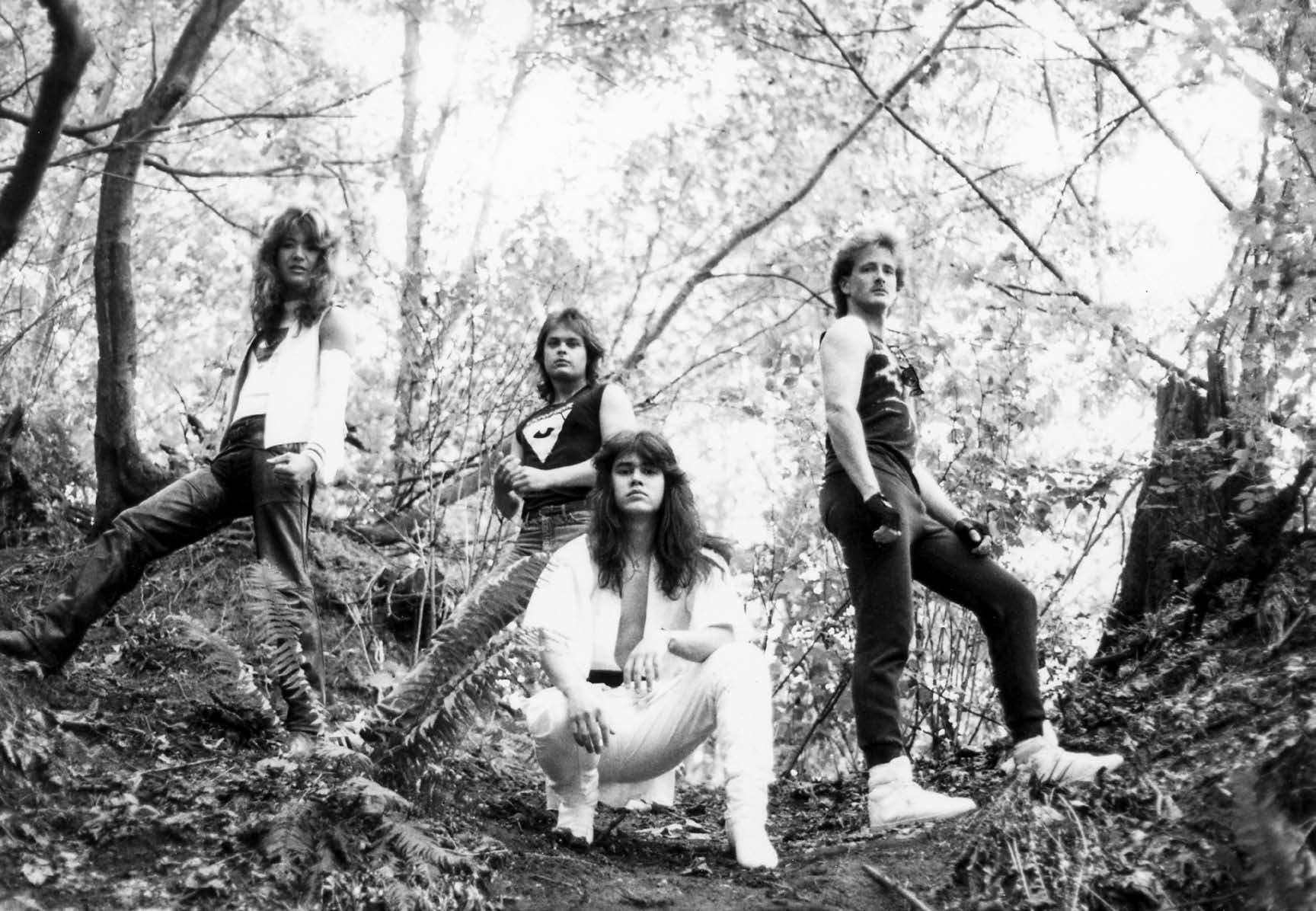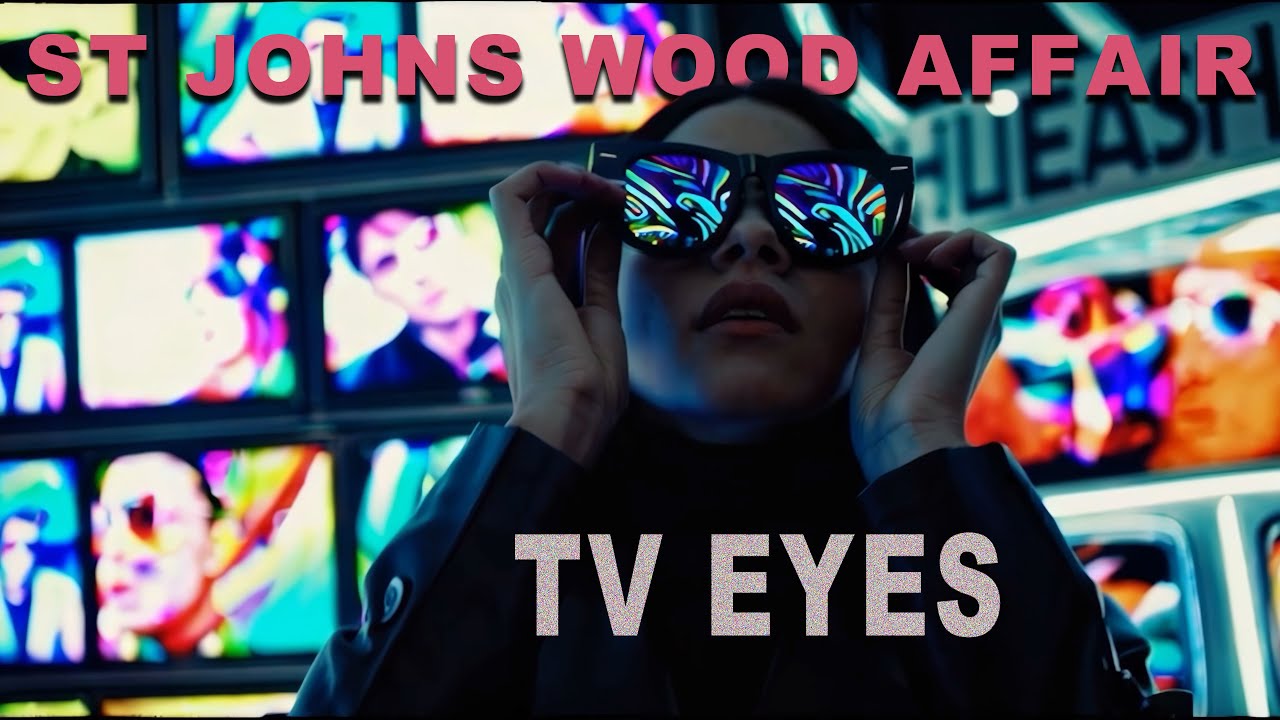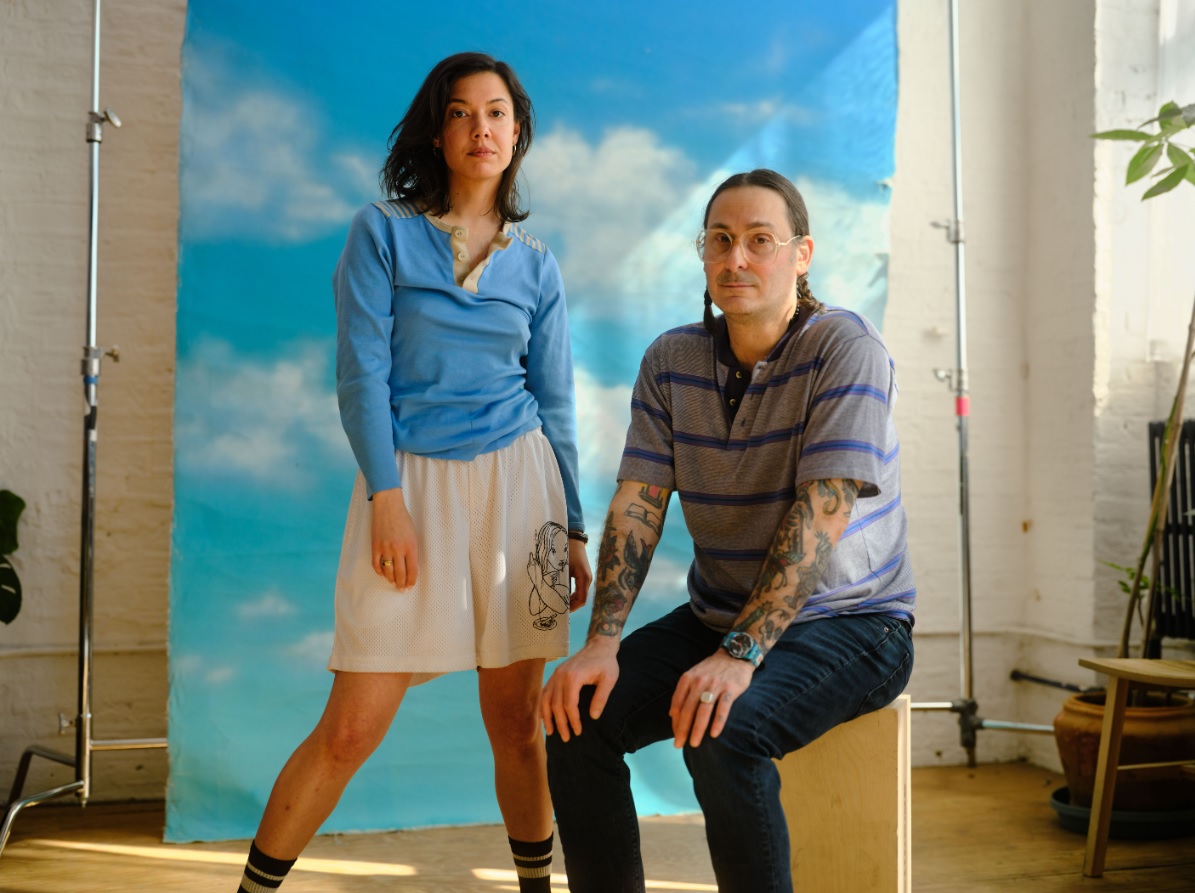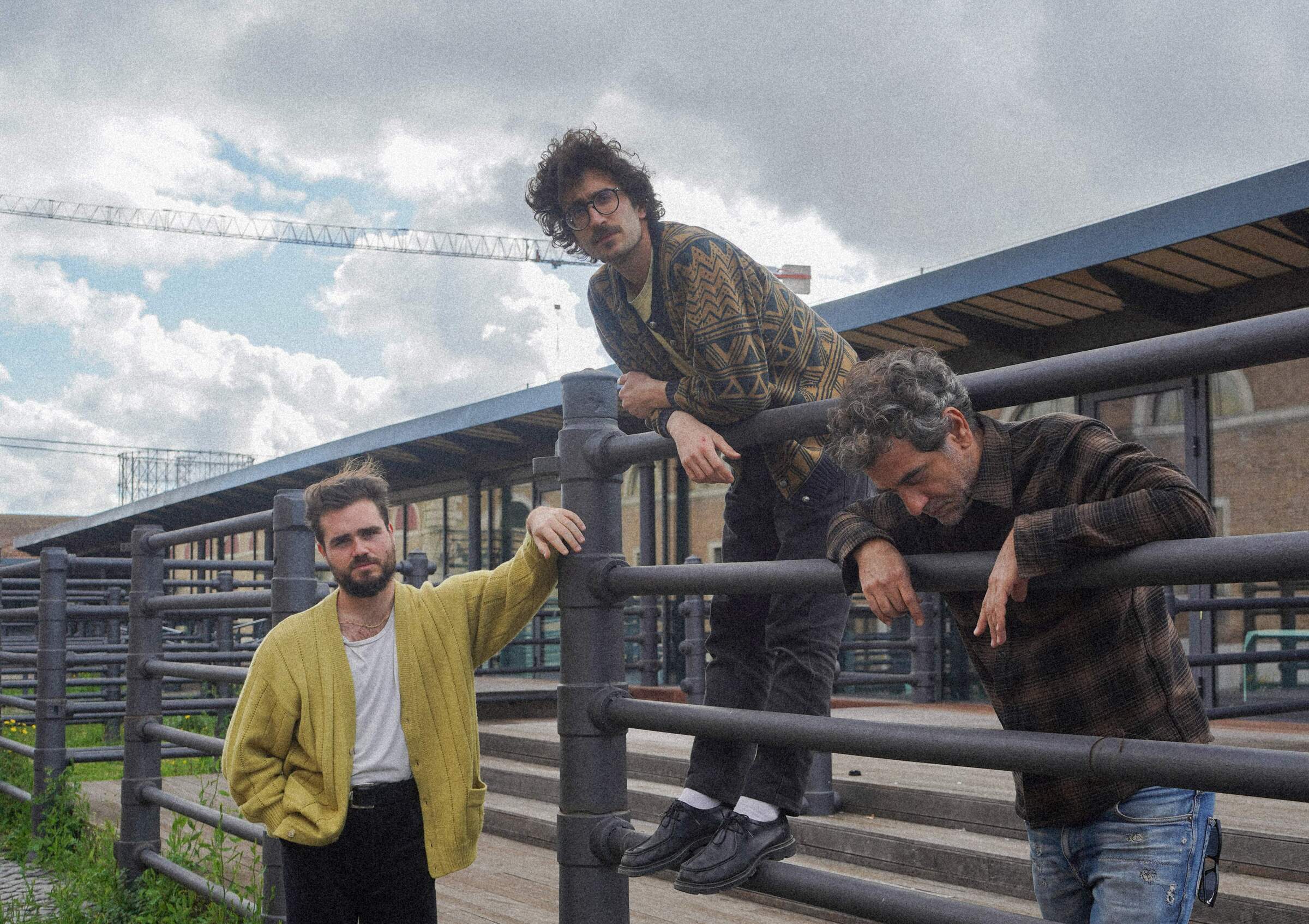Sacred Blade’s Progressive, Sci-Fi Metal Lives Again with ‘Of the Sun + Moon’
Sacred Blade are back from the depths of metal history with the Supreme Echo reissue of Of ‘The Sun + Moon,’ an album that’s long been recognized as a bold and visionary part of the ‘80s metal underground.
Originally dropped in 1986, this melodic, progressive, sci-fi-infused metal gem is proof that the band was way ahead of its time, cutting through the barren Canadian Pacific Northwest metal scene like a laser beam. Remastered from the original tapes by Brad Boatright, it brings every killer riff, soaring vocal, and otherworldly vibe to life like never before.
The deluxe 12-page booklet is a nostalgic dive into the band’s history, with unseen photos, artwork, posters, and a full-color centrefold that reimagines the original gatefold. The first pressing of 500 copies was 100 moon blue (sold out), 300 midnight black (sold out), and 100 astral-alloy silver (still available). A subsequent 200 copies on venuz-violent has also come and gone. Now, an exclusive red-blue moondust edition has been prepared for their upcoming Keep It True festival appearance.
Now, after 20 years, they’re back with the vinyl reissue of ‘Of the Sun + Moon,’ reminding everyone why they were ahead of their time. They’ll be hitting the stage for the first time in Germany at the sold-out Keep It True Festival on April 26, 2025, and with more U.S. shows lined up, Sacred Blade’s story is far from over. Keep your eyes on the skies, oh and Supreme Echo is set to repress ‘Of The Sun + Moon’ on vinyl this August-September and is also working on ‘Hammerhead Demos (1982-85),’ an archival LP.
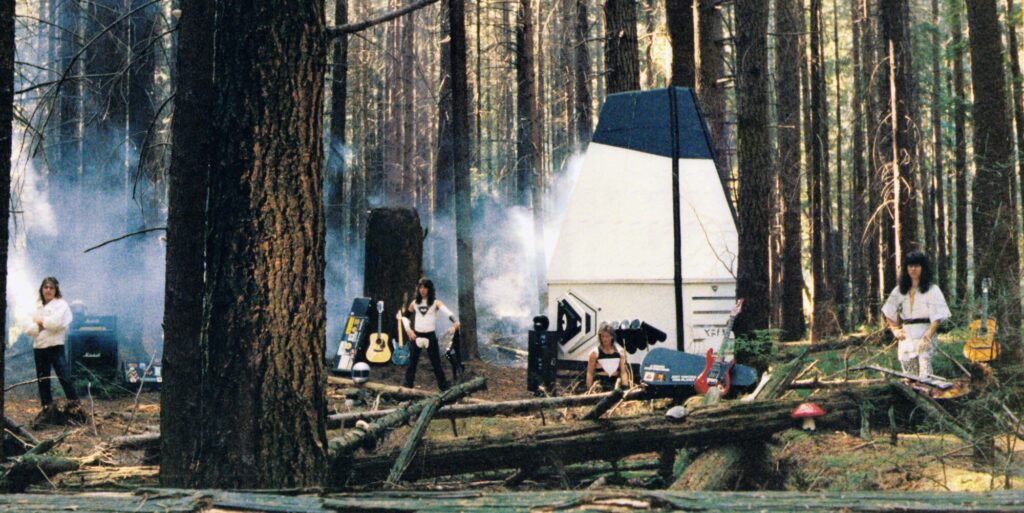
“The blend of metal and fiction was a natural byproduct of Jeff’s evolution as a writer and performer”
Let’s start from the beginning—tell me about your early years. What was it like growing up in the environment that shaped your musical tastes? Were there any specific moments or influences that steered you towards heavy metal?
Paul Davis: I started playing drums at age 4, eventually honing my skills playing along to The Beatles, Led Zeppelin, The Who, Boston, and Supertramp. Meanwhile, my parents played classical music at all times throughout the house, providing an excellent education in music arrangements and dynamics. I soon found myself increasingly passionate about progressive concept albums from Genesis, Yes, Rush, and Pink Floyd—and so many more. It was the depth of the lyrics and the complexity of the music that kept me listening then, and now! While I’m drawn to metal for the edgy guitars and double-kick drumming, my music collection still lives in the land of prog rock.
Will Rascan: For me, as a small kid, my house was always filled with music, as my father was a drummer in a polka band. Weekends would see my parents and friends gather and play old 78s of European polka classics. That spawned my interest in music, starting with Elvis, The Beatles, CCR… and when I saw/heard KISS, game over—I was meant to be a rocker! From there, it morphed into the who’s who of metal—Judas Priest was a massive influence. I loved the madman antics of Ted Nugent, purchased the Motörhead Ace of Spades album strictly for its album cover. Little did I know it was to be a metal classic. Sabbath, of course, was a huge influence. Saxon, Scorpions (loved Uli’s guitar work). Frank Marino’s live album blew me away from a guitar-playing perspective… next level. Schenker with UFO, Van Halen, of course, and I can’t forget Rush—a real prog fave of both Jeff and me. I could go on and on.
James Channing: I’ve always loved music from as far back as I can remember. When I was about 10 years old, my parents put me in guitar lessons, but that didn’t last long. Later, in early high school, I got into guitar again and took lessons from a well-known jazz player. By that time, I was listening more seriously to my early influences, which were late 1960s and early ‘70s rock (such as The Beatles, The Doors, Led Zeppelin, Jimi Hendrix, Elton John, and many others). When I met Will in my senior year of high school, he introduced me to heavy metal bands like Judas Priest, Saxon, Iron Maiden, Motörhead, Mercyful Fate, Tygers of Pan Tang, etc. I remember being blown away by these bands. I also remember being inspired by Will playing heavy metal on electric guitar—I got the bug after that. I also studied music in college while I was in Sacred Blade in order to become a better musician. There was no rock program, so I studied classical and jazz music, which was very influential in terms of learning about theory, arranging, writing, etc.
Before Sacred Blade, were you involved in any other bands or musical projects? If so, how did those experiences shape what Sacred Blade eventually became?
Paul: When Sacred Blade was formed, the band members were all so young that any musical experience they had would have been formed in high school or maybe elementary. I do remember that my church brought in live musicians, and I attended every Sunday to study the drummer and others, then go home and mimic what they had done. In high school, my drumming improved with the high school band, and I got live stage experience with the annual musical production. From there, I went straight to Sacred Blade and just tried to keep up with Jeff’s prolific songwriting!
Will: My first guitar was something my uncle gave me from his polka days. Plugged that into some cheapo solid-state amp my parents bought me, and the rest, as they say, is history! Prior to that, my parents pretty much forced me to learn the mandolin—took private lessons for two years. My real passion was drums, but my parents would have none of that in the house, so guitar it was. Jammed a bit with a friend or two in the neighborhood and joined the school band playing guitar. It was there that I met our first bass player, Tony Moser, and subsequent to that, Jeff Ulmer.
James: I had jammed with a few friends and garage bands, but nothing serious. Being asked to join Sacred Blade was a great leap forward and a dream come true!
The early ‘80s metal scene was an explosion of creativity and raw energy. What was the scene like when you were coming up? How did it influence the formation of Sacred Blade?
Paul: In the ’80s, music was branching off from rock and pop into so many interesting new styles. As a group, we were determined to avoid the keyboard or synth format and stuck to heavy, crunchy guitars with soaring solos. This kept us in the company of heavy guitar groups like Sabbath, Scorpions, Motörhead, and others. It gave our music a lot of drive!
Will: The local metal scene in Vancouver was pretty much non-existent. That said, Vancouver was ground zero for Canada’s punk scene, which was pretty cool… DOA, The Subhumans, Dishrags, Young Canadians, to name a few. There was one metal club in downtown Vancouver that I can recall, but it was full of big-hair types—we thought they were posers!
James: Will is right. There was not much of a metal scene in the early ’80s in Vancouver. Only cover bands could find a paying gig on the nightclub circuit. So to play live, we had to do everything ourselves—from finding a hall to rent, to promotion, selling tickets, playing the concert, and transporting all of our gear. In a way, doing all of these things made those tough times the best of times (in retrospect). We had a lot of fun planning our concerts and playing them. There was so much raw energy back then. The environment made us experts at Do-It-Yourself, which I guess influenced the formation of Sacred Blade.

Sacred Blade is known for its unique blend of heavy metal with science fiction themes. What was the original concept behind the band? Was there a particular story or idea that sparked the creation of Sacred Blade?
Paul: The blend of metal and fiction was a natural byproduct of Jeff’s evolution as a writer and performer. He always had diverse ideas and a unique ability to turn concept into poetry. The subject of his writing eventually had no earthly bounds, while his guitar playing became stratospheric. Outer space was simply the next logical step in the evolution.
The name “Sacred Blade” itself feels like it has a story. How did you come up with it, and what significance does it hold for you?
Paul: We were running with the name Battleaxe in the earliest years until we found it was already in use. While discussing other names, Jeff liked the word “Blade” as a nod to the heavy double-edged battleaxe, but wanted more to it. I offered the word “Sacred” as a reference to mystic energy, ritual power, and unlimited influence. The words fell together so naturally, and when you study the band’s logo, you can see the battleaxe that is formed in the pairing.
Your 1982 and 1983 demos have become legendary in the underground metal community. Can you walk us through the process of recording those demos? What was the atmosphere like in the studio, and what were you trying to achieve with those early recordings?
Paul: One of the ways of advancing our work was to seek out means to create high-quality recordings. This, of course, was no easy task for young men of high-school age. However, where there is a will, there are ways. Somehow—I can’t exactly recall how—we got the chance to help build a professional studio. Memories of fabricating studio walls several layers thick easily come to mind. We had to work with construction materials like cork board, plywood, Styrofoam, and caulking—which was well worth the effort. In exchange for our labour, we were given recording hours to create our early demos.
However, we could only record in off-hours—not during the day when prime time was reserved for full-paying customers. Because we had limited hours of studio time, the songs had to be recorded quickly—with some parts recorded in a single take. Anyway, it was an exciting time because we were actually recording our own music in a professional studio! At the time, it was a state-of-the-art facility, replete with a 48-channel mixing board and all of the latest technology found in the industry. As destiny would have it, Sacred Blade would record our demos as well as later material at this studio, which was called Ocean Sound.
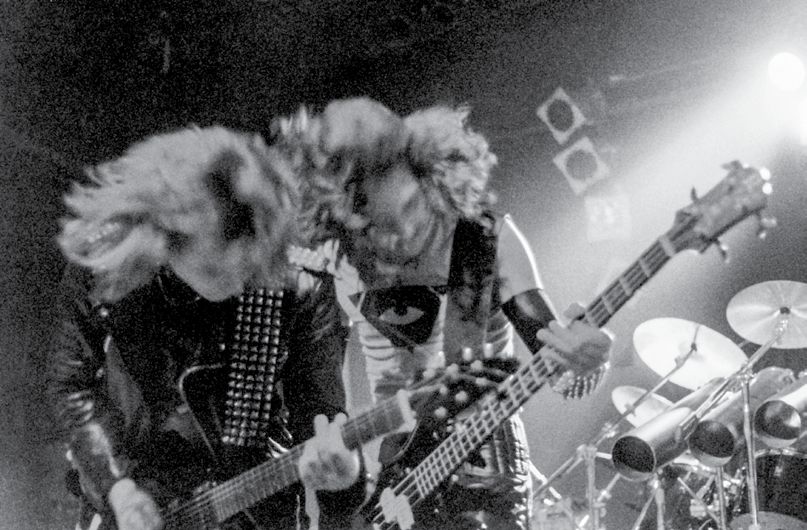
Looking back at those demos, how do you feel about them now? Were there any moments during their creation that stand out as particularly challenging or rewarding?
Paul: The work I did on the demos was limited but accurate. I feel it was a good effort for the level I was at then. I can tell you that throughout the summer of ’82, I proudly blasted Sacred Blade from my car stereo everywhere I went! Though the soundscape was limited, it was the first time we got to hear the songs with such improved clarity. The challenge was to get the sound we wanted, which we all agreed was way bigger than what’s on the demos. With that objective in mind, we spent the next two or three years improving the sound as well as our skill set.
Will: RAW! It was cool to listen to the songs, but it wasn’t until we were in a proper studio that the real sound of Sacred Blade came to life.
James: Yes! I have similar memories. Even though I did not record on the early demos, I was really excited about the songs. I remember playing them at our high school on my ghetto-blaster—and everyone was so impressed. It made me so proud to be a part of the band, because everyone could tell that the band had a great deal of energy and talent. It didn’t matter if they liked heavy metal or not—everyone was struck by Sacred Blade’s sound.
When Supreme Echo reissued ‘Of the Sun + Moon,’ it brought your work to a whole new generation of listeners. How did it feel to see your music being rediscovered after so many years? Did the reissue process bring back any specific memories from the original recording sessions?
James: It is a real thrill to have Sacred Blade re-ignited because ‘Of the Sun + Moon ‘(pronounced Of the Sun and Moon) was re-released by Supreme Echo Records. In fact, I’d like to take this opportunity to thank Jason Flower (owner/president) of Supreme Echo. It feels fantastic to see our music being discovered/re-discovered. I am very honored to learn that there are people being introduced to our music, and liking it, who were not even born when it was first released. I have been in touch with many people like this, who are discovering metal (especially rare bands) now—long after ‘Of the Sun + Moon’ was created. It is very gratifying to realize that our music has stood the test of time and is being appreciated by a new generation of music lovers!
There are so many great memories we recall now. When the band gets together, we reminisce about our experiences from each of our perspectives. It’s so interesting to hear Will/Paul/Randy recount a moment in time from back in the day. Some things I remember well, while other recollections from different band members are like legends to me. On the other hand, I have vivid memories of so many times spent with Sacred Blade—and it’s wonderful to be able to relive them with my bandmates, who are all dear friends.
Will: From my perspective, the rediscovery of Sacred Blade is very humbling. It’s pretty cool to see fans still playing the album and posting about it on social media. I think social media has a huge influence in the resurgence of music and bands. The best part of this process that has taken the better part of three years is the coming together of the band… to the point now that we are rehearsing for a festival in Germany. Who would have thought that!
‘Of the Sun + Moon’ has such a distinctive sound, blending heavy metal with progressive and cosmic elements. What was the creative process like for that album? Were there any particular challenges in translating your vision into the final product?
Will: The Sacred Blade vision was all Jeff. When it came to the music, most of the early tracks were all co-written by Jeff and me. This would have been a better question for Jeff to answer, but for me, the album pretty much encapsulates the vision. I would like to mention that the remastering of the re-release adds more punch to the sound. I’d like to express my admiration for Brad Boatright (American musician, record producer, and mastering engineer) – he deserves a lot of credit for doing such an awesome job of remastering. Everything sounds great, and we love it!
Paul: ‘Of the Sun + Moon’ represents a cross-section of writing that had taken place in the years preceding it. Early classics like ‘Master of the Sun,’ ‘Salem,’ and ‘Moon’ were blended with later titles like ‘The Pressing’ that were still being worked on when we began recording! ‘Of the Sun + Moon’ (the song), ‘Fieldz the Sunshrine,’ and ‘In Light of the Moon’ were all new and so visionary. Jeff’s concepts became more thematically linked, and that thread simply strung the album together. We sure could have used a bit more funding at the time though, lol! That was challenging.
James: Well, I can think of a few challenges – and this is something that Paul and I thought about when reflecting back on the days of recording ‘Of the Sun + Moon.’ For one thing, we were all living through an era that could be described as “the worst of times.” The economic climate in the early ‘80s had gone into a deep recession. There was no work for anybody, so money was tight. Adding to that was the fact that we were still very young at the time, having commitments like finishing high school, and working at various paying jobs, etc. This introduced the challenge of the protracted length of production – many issues arose that would cause delays to recording/production. One of the biggest delays came as a result of a record company executive visiting Vancouver to hear some preliminary tracks. The label liked what they heard but had their own ideas of how to brand and market our band. In their view, Sacred Blade would be presented as a typical heavy metal band – which meant featuring a skull and crossbones on the album cover – or something cliché like that. We would have nothing of it! We were adamant about the vision and insisted that our record deserved a gatefold release. There was some back and forth with the label, but at the end of the day, we cancelled our recording contract to maintain artistic integrity. We were hell-bent on the pursuit of excellence, and figured that it was best to stay true to the vision and create the sound that we all wanted. I can honestly say that we didn’t settle for anything. Although our journey took longer – it was worth it.
Recording and producing an album can be an intense experience. What are your strongest memories from the time you spent working on Of the Sun + Moon? Were there any unexpected moments or stories from the studio that you can share?
Paul: I remember that my drums sounded amazing at Ocean Sound Studios and it was very inspiring! We set up my kit in a very large, tall sound room that had great natural reverb. My drums sounded huge and loud! That beautiful sound was piped back into my headphones, and to this day, I have never had a better time playing on a set of drums because of that sound. It was extremely satisfying!
Will: What I recall is the long hours and recording late into the evening. So, with late nights came inviting friends to the studio. Energy levels were usually high with a sense of being in the big leagues… we had a real sense of pride and accomplishment. State-of-the-art recording equipment for the time added to the pride I felt in what we were doing. We were young and excited to be there… and Jeff (along with the sound engineer) made sure we got the job done! I was usually huddled in an isolation booth… playing along to a pre-recorded bass/drum bed track. I remember playing parts over and over, hands getting sweaty… just doing my part…
James: Yeah, I remember being in the iso-booth a lot. We were so focused. We worked hard to obtain the technical aspects of the parts but also sought to capture the musical fluidity of every track. It was a fantastic atmosphere characterized by professionalism, camaraderie, and youthful exuberance!
Paul: Oh, and one more thing… I do recall a particular moment, however, when I knew for certain that the album was going to get the attention it deserved. Jeff worked for an entire day trying to get just the right sounds to lay down solos on tracks like Moon and Salem. Suddenly, I was hearing new and improved guitar sounds that would rival anything I had ever heard from my favourite guitarists like Gilmour, Page, Townshend or others. He then proceeded to play his solos flawlessly and with tremendous expression and passion. I smiled to myself, knowing that we would exceed all expectations.
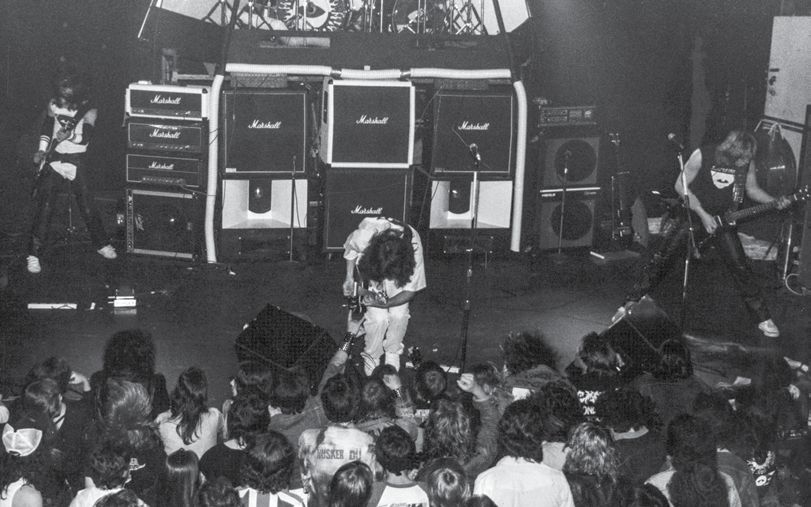
The cover art for ‘Of the Sun + Moon’ is iconic in its own right. How did you develop the concept for the album artwork, and how important is the visual aspect to Sacred Blade’s identity?
James: Even though Sacred Blade had a very heavy side to our music – we were much more dynamic than meets the eye. After all, the band had already been described as “Astral Alloy,” a term coined by rock critic Tom Harrison when Sacred Blade was featured in a full-page story in the Vancouver Province (one of the city’s two largest newspapers). Our fearless leader Jeff had developed the concept for the album artwork and would stop at nothing to maintain the integrity of Sacred Blade’s identity – both visually and in terms of our sound. The cover art for ‘Of the Sun + Moon’ was a series of do-it-yourself experiments by Jeff. In brief, Jeff not only painted the front and back covers of the album, but he also used innovative photography to create the final product (by reflecting images and employing some creative camera work). The full story of how this came about is described in the booklet that accompanies the Supreme Echo re-release. And I would be remiss if I didn’t mention the photograph used for the gatefold album (and also appears in the Supreme Echo re-release). Once again, Jeff’s artistic talent would shine through. The photo shoot was a portrayal of Sacred Blade arriving in the forest after landing their spaceship, called the Orclarze. The Orclarze stood 16 feet high and was used in our first headlining show. The photo has loads of hidden artifacts and has personal meaning to the band (who went through great lengths to arrange the mystical shot). This is one of those moments I have in mind when I say, “It was the best of times.” You’ll have to read the booklet to get the full story.
Paul: We’re very pleased with the booklet that comes with the re-release of our album by Supreme Echo Records. The format of the booklet turned out great and we included a lot of our favorite memorabilia and previously unseen photos in a very cool collage. We hope you’ll enjoy all of our stories!
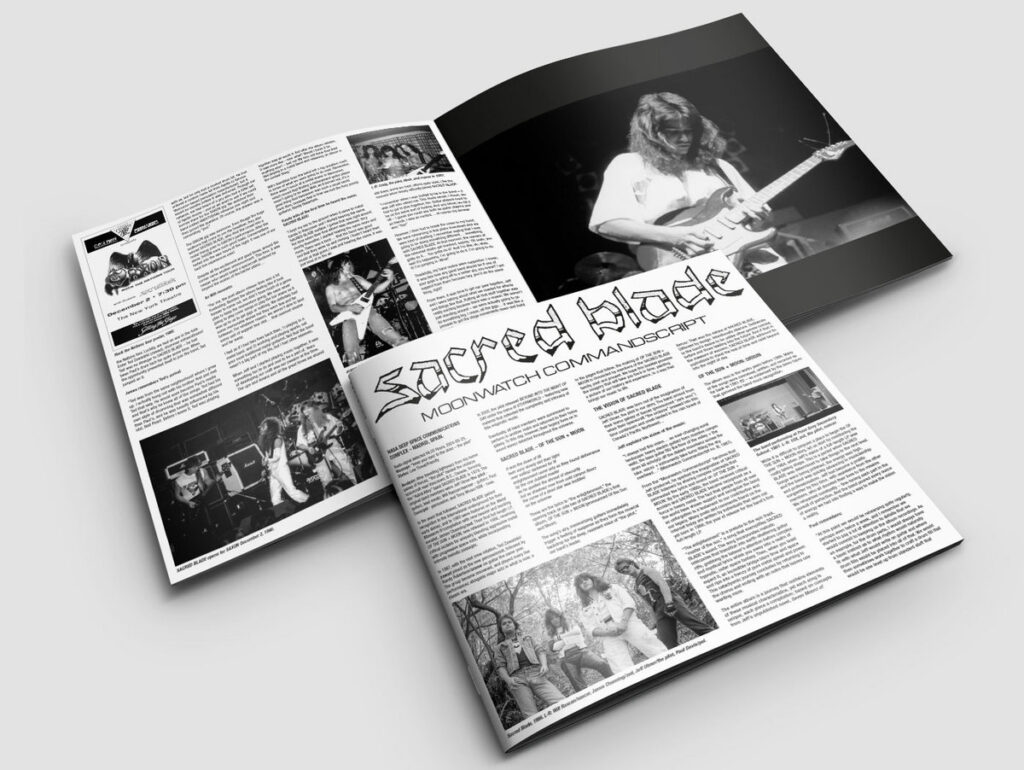
Sacred Blade wasn’t just a studio band; you also played live gigs. What were some of the venues you played, and how did the live scene treat you? Any memorable shows or cities that left a lasting impression?
James: We put together a lot of concerts on our own since original acts weren’t able to play the nightclub scene (only top-40 bands got those opportunities). So, we rented halls and did everything ourselves (more Do-It-Yourself work). Eventually, once we had made a name for ourselves, we became Vancouver’s premier heavy metal band. We got the calls to be support for major acts such as Exciter, Exodus, and even Saxon during their Rock the Nations tour.
Paul: Every live gig had a lot of energy, both on stage and off. The mops of hair head-banging before us was great fun to witness, and I felt it spurred us on. At our first headliner gig at the York Theatre, I cannot forget my legendary space helmet pumping out so much dry ice smoke that my drum kit disappeared! How odd to be laughing and choking at the same time! Even more unusual was that I could no longer see my bandmates either, due to the height of the towering drum riser. Strangest of all is the scarcity of images of me playing live with Sacred Blade, lol! Was I ever really there, or did I just dream all that?
In the early days, which other bands did you share the stage with? Were there any groups you felt a particular kinship with, or perhaps even a rivalry?
Paul: We were supposed to share a stage with Metallica in Seattle, but they couldn’t make it, so we headlined in their place. They were very much contemporaries at the time, and we even spent a little time with them in those early years prior to their rise to fame.
James: We didn’t really have “rivals” per se, as Sacred Blade was unlike other bands from Vancouver – we were in a category of our very own. I do remember the concert that Paul is talking about though. On the same night, we met Metal Church, who had come to see the show. They liked us, and the feeling was mutual – so we became friends. I think we hit it off because we were both hard-rocking bands (as opposed to the hair-metal posers that were popular back then). I’d have to say that Metal Church were our closest allies as fellow pioneers of the West Coast metal scene. A few years later, at the nexus between heavy metal’s decline and the rise of grunge, we supported Alice in Chains. I remember hanging out with Jerry Cantrell after the show. He hadn’t become famous yet, so I only knew him as the guitar player in the other band. Anyway, at one point, I said that I had to go home. Jerry encouraged me to have another beer with him, but I had to work very early in the morning, so I left. To this day, I can’t believe I turned down Jerry’s invitation in favor of going to my day job. What a mistake! But that was the reality back then. We had bills to pay, and it was a struggle to be in a band. It was like I had to have two lives.
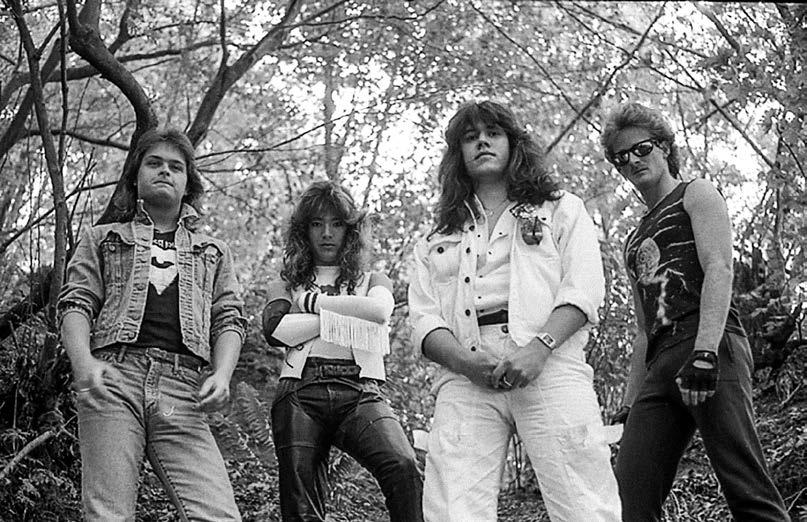
Every band has that one gig that stands out as the craziest or most unexpected. What was Sacred Blade’s wildest gig? What happened that night?
Paul: In particular, the mosh pit at the DOA gig was unforgettable. A monstrous man with a bad attitude planted himself front and center and fought off all attempts to remove him from the chaos at the front of the stage. It’s one of the few gigs where we actually have some footage of such energetic mayhem. My lasting memory of that show was spotting a beer bottle turning end over end, heading right for me from an exuberant fan! I ducked just in time to have it glance off my cymbal with a resounding crash. Now that’s live!
James: For me, the wildest gig was playing with Saxon. They were so nice to us. They treated us very well by stocking our dressing room with food and beverages, hanging out with us, etc. It wasn’t that things were crazy or unusual in terms of what bands do while playing a show or fraternizing afterward. It was an unexpected remark from Saxon’s guitarist, Graham Oliver, that sticks in my mind. I had said to him, “I want to play with you guys in Europe!” to which he replied, “That’s the attitude… Never surrender!” I’m still inspired by that moment in time.
After Sacred Blade stopped playing, what happened next? Were you involved in other musical projects, or did you step away from the scene for a while?
Paul: I left the band just after the album came out and, for a while, didn’t play at all. Then, eager to try different styles, I joined an original folk-rock project in the 90s and offered myself around to others who were jamming.
Will: I stepped away entirely from music/playing guitar. I sold off my guitars and amps, started a family, and pursued my career in finance/capital markets. It really wasn’t until the last 5 years or so that I bought some gear and started playing again…it’s like riding a bike!
James: I played in a few other bands – as lead singer instead of bassist. It was a lot of fun to play parties, university/college gigs, pubs, etc., but it was never comparable to playing original metal with Sacred Blade – a band that had a following (mostly in Europe) and a reputation for pioneering “Astral Alloy.” I later decided to go to university myself, and the rest is history.
Music is something that stays with you, even if you’re not actively performing. Are you still involved in music today, whether with Sacred Blade or another project? If not, do you miss it?
Will: I’m not involved in anything else other than Sacred Blade today. I’m an avid listener of music, and that will never change. What I am most proud of now is my son touring North America as a DJ/producer in his group, No Thanks. The musical torch has been passed!
James: I stopped playing music in the mid-1990s, as all my time was spent studying at university and working. I never lost my passion for music and missed being in a band – particularly missed the glory days of Sacred Blade (when we were up-and-coming and our dream was becoming a reality). Playing live is such a rush, and my performances with Sacred Blade were the greatest experiences in that way – because the music is so powerful. There is just something about playing original music as opposed to playing covers. There was a great deal of passion in Sacred Blade, and I miss it for sure.
Paul: In 2002, I followed a strong desire to play covers and enjoyed a long and successful run at it for the next 18 years, playing nearly 800 shows! Along the way, I developed the ability to sing lead and harmony while playing drums, which I’m still doing to this day with my current cover band, as well as Sacred Blade.
James: Oh yeah, I guess we should mention that we’re back at it! We’ve had a few reunions with all surviving members getting together and getting to know each other again. This includes Jeff’s sister, Jennifer (Ulmer) Hewitt, who is featured live on vocals to hit some of the high notes! Also, our second drummer, Ted Zawadski, has moved on to the Othyrworld. We miss them both dearly. It is in their spirit that we’ve rekindled or sparked new friendships. I’ve always been close to Randy Robertson (second guitarist), but now Will and Paul have gotten to know him. I got to meet the original bassist, Tony Moser, for the first time as well. This is all thanks to the re-release of our album by Supreme Echo Records. It’s really touching when we get together. We talk for hours and bring memorabilia to jog our memories. We have lovely meals and jam into the wee hours. It is really a gift that we’ve been given, and it means a great deal to all of us.
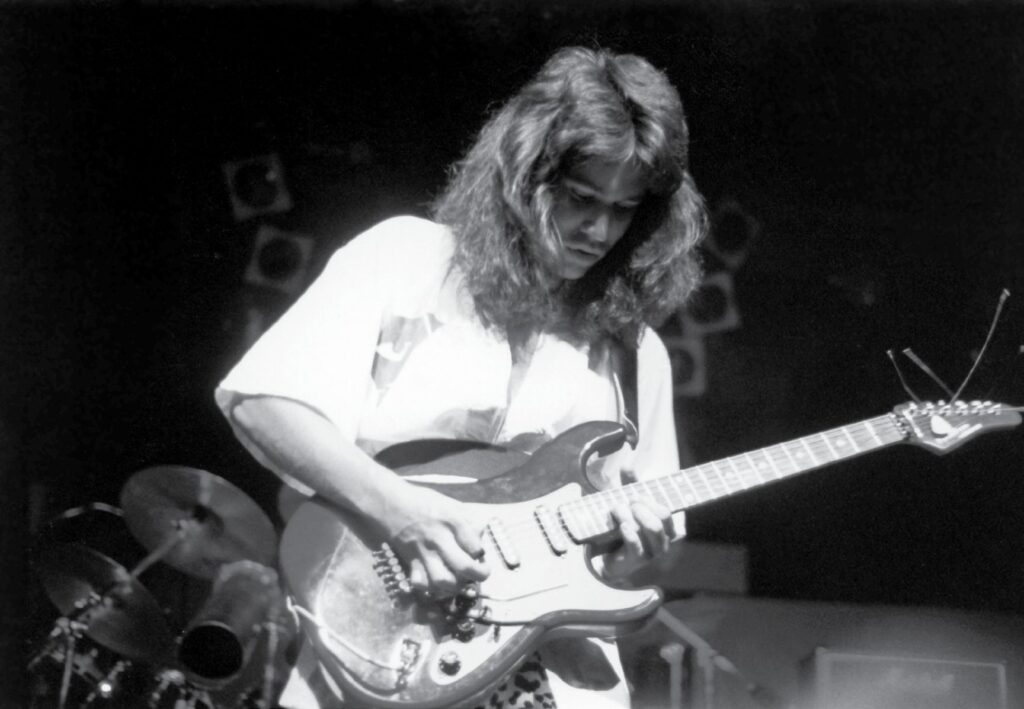
Looking back at Sacred Blade’s journey, what do you think was the band’s biggest achievement? Was there a moment when you realized that what you were doing was special, that it would resonate long after you were gone?
Paul: I feel the band’s biggest achievement was to carry the torch for hard-hitting rock and roll in a city that desperately needed it but had little reward attached to it. In short, a bunch of local kids created some hard-hitting progressive rock that would fluctuate from heavy to tender in the span of a song. Nobody in Vancouver was doing that at the time, as most rock bands didn’t seem to be taking enough chances. We couldn’t seem to hold ourselves back! Lots to be proud of there.
Will: For me, the biggest achievement was the making/release of the ‘Of the Sun + Moon’ album. What continues to amaze me is how much fans still enjoy it.
James: Yeah, for sure, Will! Our biggest achievement was releasing ‘Of the Sun + Moon’ – an epic record with no artistic compromises. We got a lot of recognition and respect because of our first album. The reception we got in Europe made me realize that we were special – and different from the sea of bands out there at the time. And the fact that we’re seeing a resurgence of metal with new/renewed interest in Sacred Blade is really inspiring.
If you had the chance to do it all over again, is there anything you would do differently with Sacred Blade? Any missed opportunities or moments you wish you could revisit?
James: The only thing I can think of is producing and releasing records faster. Jeff was a genius as well as a perfectionist. If only we had more support and investment from the industry – then we could have been more timely in producing music (because of not having to do everything ourselves). Still, Sacred Blade was very prolific – thanks to the driving force of our leader, Jeff Ulmer.
Will: I think if the goal was to be a touring metal band, maybe we should have moved to a city that was better suited for metal…like New York or the San Francisco Bay Area. Vancouver wasn’t the place to play original metal, unfortunately. Relocating is easier said than done.
Paul: What was missing at the time was enough funding to keep us all comfortable and promote this great music more widely. Instead, we would leave eventually to sustain our lifestyles and grow careers in other fields. If we could press rewind, I’d get a big bag of money somehow and spend much more time in the studio and on stage without having to worry about anything else.
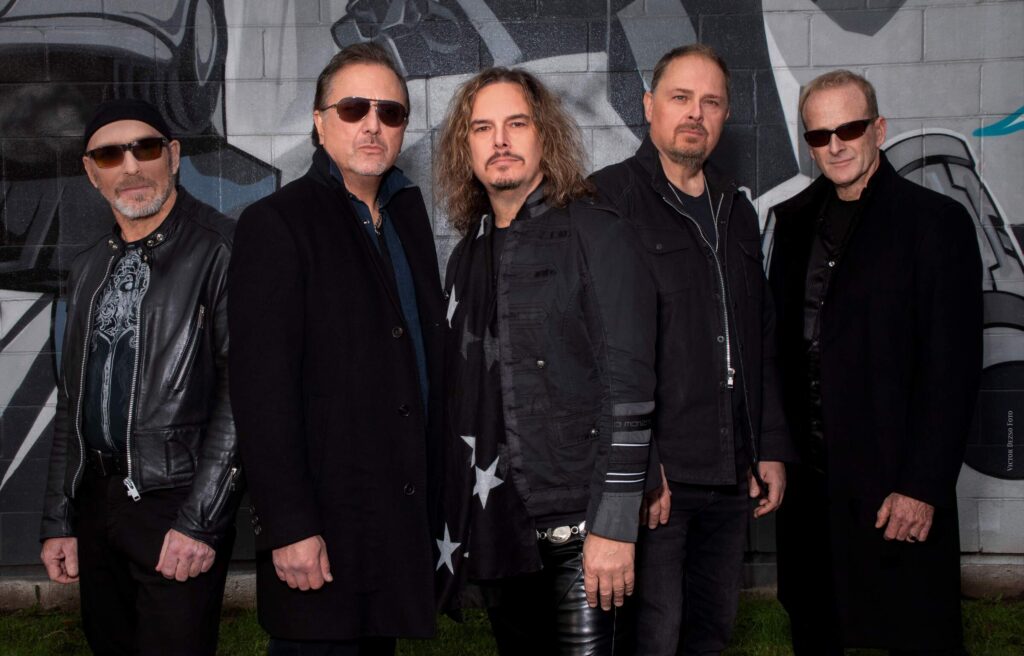
Thank you. Last word is yours.
Paul: Looking forward, it seems we’re getting another chance to rock without the benefits of time travel. Our album is out again, and there’s a live gig on the horizon. Looking far enough down the road, perhaps our new experiences together and improved skill sets might even lead to new Sacred Blade music? I’m a great believer that all things are possible with hard work and determination. Keep your eyes to the skies, and we’ll see!
Will: Just that it’s so cool to have Sacred Blade back together after 35-ish years! Thanks to Supreme Echo and Jason Flower for believing in the project, and thanks to all the fans for their continued support. Hopefully, our first gig in 35 years will be the start of something special…you never know!
James: Well, I guess the cat’s out of the bag now! Yes, we’re going to be playing together in 2025 – and you might say it’s for the first time ever. The surviving members of Sacred Blade will all be there – and we’ve actually never been on stage together in this configuration. It is a tribute to Jeff Ulmer, who started it all. Our hearts will be with Ted too – a masterful drummer who was another driving force in our live shows. We are so excited and are working hard to bring an entertaining and unique experience for Sacred Blade fans. See you soon!
Klemen Breznikar
Sacred Blade Website / Facebook / Instagram / YouTube
Supreme Echo Facebook / Instagram / Bigcartel / Bandcamp

